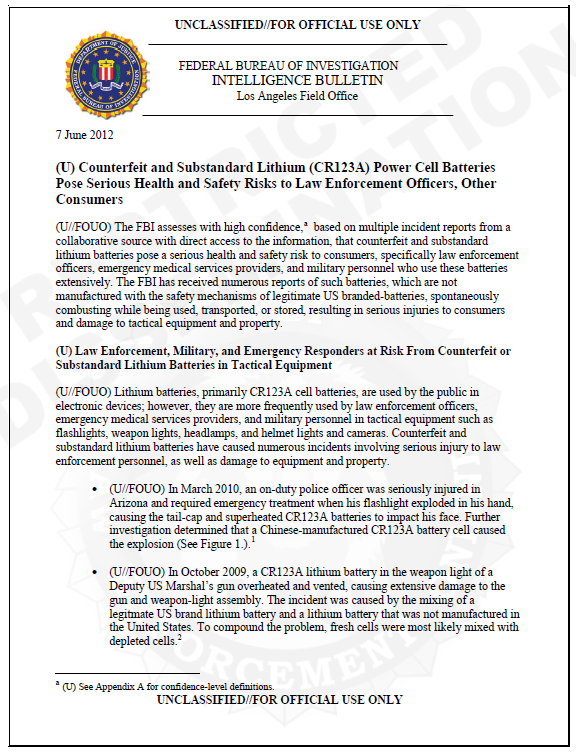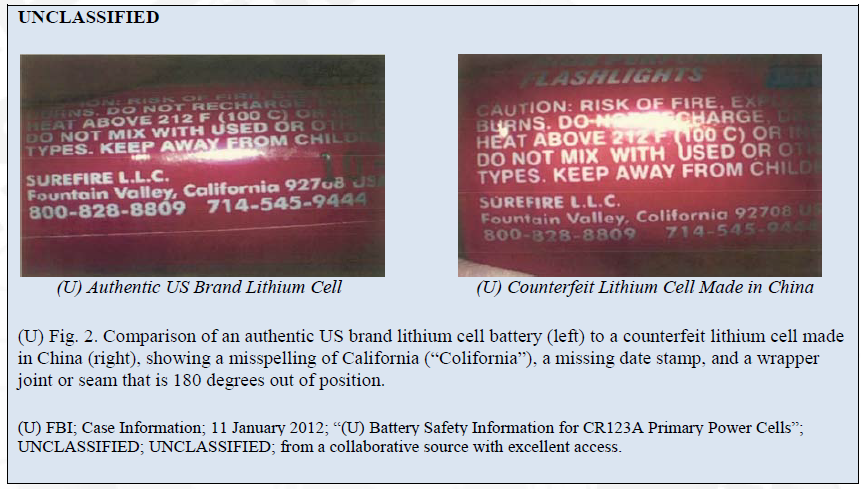Counterfeit and Substandard Lithium (CR123A) Power Cell Batteries Pose Serious Health and Safety Risks to Law Enforcement Officers, Other Consumers
- 9 pages
- For Official Use Only
- June 7, 2012
(U//FOUO) The FBI assesses with high confidence, based on multiple incident reports from a collaborative source with direct access to the information, that counterfeit and substandard lithium batteries pose a serious health and safety risk to consumers, specifically law enforcement officers, emergency medical services providers, and military personnel who use these batteries extensively. The FBI has received numerous reports of such batteries, which are not manufactured with the safety mechanisms of legitimate US branded-batteries, spontaneously combusting while being used, transported, or stored, resulting in serious injuries to consumers and damage to tactical equipment and property.
(U) Law Enforcement, Military, and Emergency Responders at Risk From Counterfeit or Substandard Lithium Batteries in Tactical Equipment
(U//FOUO) Lithium batteries, primarily CR123A cell batteries, are used by the public in electronic devices; however, they are more frequently used by law enforcement officers, emergency medical services providers, and military personnel in tactical equipment such as flashlights, weapon lights, headlamps, and helmet lights and cameras. Counterfeit and substandard lithium batteries have caused numerous incidents involving serious injury to law enforcement personnel, as well as damage to equipment and property.
…
(U) How to Avoid Purchasing or Using Counterfeit and Substandard Lithium Batteries
(U//FOUO) Several indicators are associated with counterfeit or substandard lithium batteries; awareness of these indicators can decrease the chances of purchasing inferior batteries that can put users at risk.
• (U) Common exterior indicators of counterfeit batteries include label misspellings, missing label information, blurred fonts, altered logos or seals, different label dimensions, altered or substandard packaging, crimp seal differences, material differences, and differences in the vent perforation of the anode.
• (U) Counterfeit and substandard lithium batteries are often sold at a reduced price on the Internet and at swap meets, store fronts, gun shows, and electronics and technical shows. Although not all batteries sold at these locations are counterfeit or substandard, such sellers are often sources of counterfeit or substandard batteries produced in China and the chance of purchasing a counterfeit or substandard battery is higher at these locations.
(U) Outlook and Implications
(U//FOUO) The FBI assesses that counterfeit and substandard lithium batteries will continue to pose a health and safety risk to law enforcement officers, military personnel, and emergency medical services personnel, as well as unwitting consumers in the general public, as long as they are available for purchase. Taking the following precautions, however, can reduce the likelihood of user injury or property damage from either the purchase of counterfeit and substandard batteries or the improper use of legitimate lithium batteries.
• (U) Law enforcement, military and emergency personnel should use caution when purchasing batteries from online auction sites, online vendors, store fronts, gun shows, electronic and technical shows and swap meets. Individuals purchasing batteries on the secondary market should seek quality assurance and scrutinize labels, packaging and contents; seek authorized retailers; watch for missing sales tax charges; and insist on secure transactions, according to the International Trade Commission.
• (U) To prevent a catastrophic event when using legitimate lithium batteries, individuals should refrain from improperly mixing different types and brands of batteries; using a combination of batteries with different depletion levels (that is, mixing old and new batteries); and removing lithium batteries from one product and placing them into another product in which they are not intended to be used (such as removing a lithium battery from a flashlight and placing it in a camera).
(U//FOUO) The FBI assesses that in addition to the safety risks, the sale of counterfeit and substandard lithium batteries has a negative economic impact on both users and US manufacturers of legitimate lithium batteries. The widespread use of tactical equipment and electronic devices requiring lithium batteries among law enforcement, emergency medical services providers, and military personnel can lead to significant costs for these agencies if they purchase and then must replace defective batteries, tactical gear and property, or pay for emergency care. US manufacturers lose potential revenue when producers in China and other countries profit from the fraudulent use of US brand holders’ trademarks. In addition, when incidents occur involving what appear to be legitimate US batteries, the brand holder often faces costs in terms of both money spent on testing to determine the cause of the incident and potential erosion in brand confidence among consumers.



